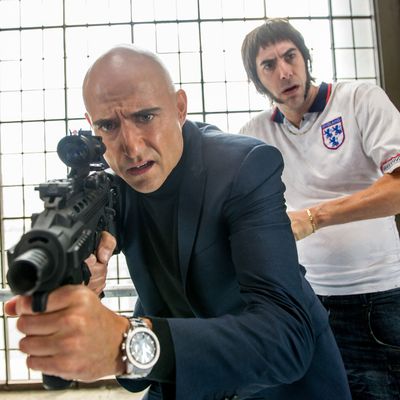
Sacha Baron Cohen doesn’t use comedy to make you laugh, he uses it to make you cry out in pain. As Borat and Bruno and even in his new James Bond parody, The Brothers Grimsby, he’s even more violent than the hyper-aggressive Adam Sandler, who, down deep, wants you to see him as a romantic figure with a child’s aching sense of abandonment. Baron Cohen has a different fuel source. He has a punk’s righteous infantilism along with a post-punk’s protective irony. He’d likely tell you that having his character hide in an elephant’s vagina and help the elephant’s sexual partner to ejaculate quickly is both a gross-out gag and a way of making fun of an audience that would want gross-out gags. Ditto the scenes in which fleshy heterosexual men have their assholes penetrated. It’s not real homosexual panic, you see. It’s camp homosexual panic. It’s tongue in, uh, cheek.
The question that inspired The Brothers Grimsby is, “What if James Bond had a brother who was the agent’s polar opposite?” Where Bond — here called Sebastian and played by Mark Strong — is sleek and cool, and beds but doesn’t commit to women, his long-lost brother, Nobby (Cohen), is a paunchy, working-class, snaggletoothed cretin with a passion for football, a sloppy sex life with his wife (Rebel Wilson), and a gaggle of undisciplined kids. Three decades earlier, orphans Nobby and Sebastian were separated under traumatic circumstances, but while Nobby has longed for a reunion, Sebastian has repressed his pain or channeled it into hyper-efficient killing. Their coming together upends them — and the world.
For The Brothers Grimsby, Baron Cohen didn’t choose a comedy director but a kinetic Frenchie action man, Louis Leterrier. His chase and shoot-’em-up sequences have always been slightly (although never ruinously) shambolic, and here he ups the shambles quotient. After Nobby disastrously messes up Sebastian’s attempt to take out an assassin at a gala World Health Organization event, the pair go on the lam, and Leterrier makes every shoot-out and car chase several degrees and beats off. The action lacks dash but it’s often on the verge of being amusing and exciting. On the verge.
A few critics have compared this movie to Kingsmen, which, for all its outlandish gore, was a thriller. But the jolts in The Brothers Grimsby have little to do with the nominal spy plot and everything to with the human (and animal) body at its most grotesque. The bare bellies of fat middle-aged men wobble into the camera. Both Rebel Wilson and Gabourey Sidibe have let-it-all-hang-out sex scenes. Barkhad Abdi — of Captain Phillips — plays a heroin smuggler whose single joke is his talent for stuffing his considerable stash up his bunghole.
There is an emotional component to The Brothers Grimsby, a dramatic arc in which the uptight Sebastian is forced by his brother to loosen up, to become less anal-retentive. More than any of his fellow Brits, Baron Cohen is militantly anti anal-retentive. He wants to give James Bond an enema. He tests your gag reflexes and I’m sure that — if such a thing were possible — he’d try to make your bowels release. And he knows that anyone who objects too pompously to his work will end up looking silly. When I did a profile of Tim Burton after the release of Beetlejuice, Burton cackled over Siskel and Ebert’s pan of the movie. They had to show a clip, he told me, and they had to say the word “Beetlejuice” over and over. It was a symbolic win, much as Baron Cohen’s is when you consider the nature of the words I’ve used to convey the breadth of his smuttiness. In a way, the candid camera is on his critics.
Parts of The Brothers Grimsby are very funny. There’s an excellent sex-slavery gag (really), and a great, classical farce mix-up scene (two characters talking about entirely different things) involving a penis and a long, bowl-clogging bowel movement. The physical abuse heaped on a part-Israeli, part-Palestinian boy with AIDS is impressive. Although Ian McShane and Isla Fisher are wasted, Mark Strong’s lean physique and deep vocal resonance give his Sebastian a brusque authority.
I was lucky to go to a big New York screening at which Baron Cohen appeared, and to see up close how he operates. He told the crowd to cheer louder because he’s famous. Then he tried to lead us in the Borat song that celebrates killing Jews. The best part was when he showed a short film cobbled together from behind-the-scenes footage from Bruno, in which Baron Cohen and his crew hold serious meetings to determine the possible physical threat posed by a white supremacist they were planning to prank. The actual encounter — in which the man discourses on the Jewish menace before he’s subjected to a violent gay lovers’ spat that sends him even more off the deep end — isn’t especially illuminating. But the end-title “punch line”— this was the guy who shot three people to death outside a Kansas City Jewish center — quieted the crowd with a vengeance.
I wish I could believe more avidly in Baron Cohen’s brand of guerrilla comedy, in what he views as his moral imperative to entrap and then push the buttons of bigots, anti-Semites, and members of the wealthy ruling class. In the course of planning the above prank, he tells his crew that you “don’t have to be funny to be satirical.” But what in the end was he satirizing? All I can see is a peculiar — and unexamined — sadism.


